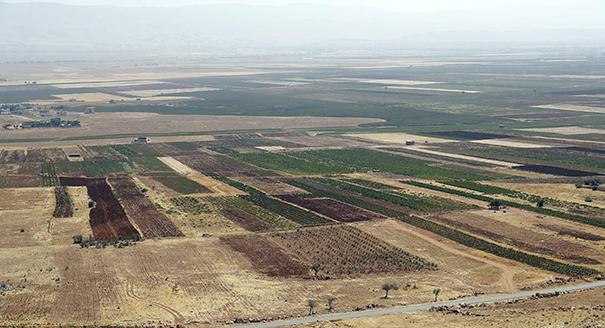Amid Lebanon’s deepening economic and financial crisis, individuals, organizations, and state bodies have launched initiatives encouraging people to return to their villages and engage in agriculture. Urban life has become difficult as Lebanese have lost their jobs, the Lebanese pound has depreciated, and foreign assistance to Lebanon has not been forthcoming. Fearing that this could lead to shortages in vital necessities such as food, backers of such an approach have increasingly been making their case.
One thing that has driven this approach is that Lebanon imports most of its food. With the county’s foreign currency reserves dwindling, there is a real fear that it may not be able to feed itself in the coming months. That is why local campaigns have advocated expanding agriculture to provide food security, while barter arrangements have been introduced as an alternative to the cash economy.
The Lebanese have a collective memory of the great famine that swept Mount Lebanon between 1915 and 1918, which killed an estimated 200,000 people, at the time half the population of the mountains. However, reversing decades of urbanization, with more than 90 percent of Lebanese today living in and around cities, will not be easy, especially without the necessary funding.
Not surprisingly, political actors, alongside municipalities and nongovernmental organizations, have played a leading role in the campaign. For politicians or parties, supporting agriculture and a decentralization of the economy and daily life represents a way of retaining legitimacy in difficult times, while also providing a means of maintaining their influence over their sectarian or local clients.
The most vocal supporter of expanding agriculture has been the Druze leader Walid Joumblatt, who urged his followers last December to return to the land. There have been reports that some parties have stored food for their constituencies in the event the situation worsens. Hezbollah has appeared to be the most prepared for this effort. In certain places, party-affiliated local councils have surveyed the needs of the population and identified unused land for agriculture. They have also advised planting certain crops over others.
While the expansion of agriculture has not been significant, it has not been negligible either. The aim is not so much to resolve the problem of rising food prices, but to mitigate its impact. Municipalities in the South, the North, Mount Lebanon, and the Beqa‘ Valley have made plans to cultivate unused land, and they have distributed seeds and organized agricultural cooperatives.
That effort came to a standstill after the demobilization of Lebanon’s protest movement and the appointment of a new government last January. This was mainly due to a lack of expertise and a dearth of funds to purchase imported seeds and fertilizers. Little thought was given to which crops were needed or how to sustain agriculture outside specific seasons. Overall, the efforts were not sufficient to increase agricultural production and meet local demand.
Then Covid-19 hit. The coronavirus crisis and the growing economic strain it has placed on an already battered economy have had several repercussions on the impulse to leave urban areas. The global economic shutdown has meant that Lebanon may find it that much more difficult to secure assistance from the International Monetary Fund, given that so many other countries are also in distress. That means that unless the country can help itself and find ways to revive its economy, there may be a new momentum to leave urban areas and return to the village, adding vitality to local life outside the cities.
The Covid-19 crisis has also set in motion dynamics empowering municipalities, which would be the drivers of more decentralized economic activity, such as agriculture. Local councils have taken the lead across Lebanon in fighting the spread of Covid-19, imposing curfews and quarantines and going so far as to block roads to control the flow of people in and out of municipal boundaries. Smaller towns and villages have seen a larger influx of people from urban areas, who prefer to be confined in rural areas where they are freer to move around. Yet in some areas this has led local councils to urge inhabitants not to receive or rent their properties to newcomers, Syrians or Lebanese, so as to prevent the virus from spreading.
This enhanced municipal authority holds potential advantages for agricultural development in that it may facilitate the adoption of local initiatives. But what it may also do is augment political competition at the municipal level. For example, Hezbollah has been at the forefront of efforts to spread its influence locally, where it has not been as dominant as it has been elsewhere.
In a March 14 speech, the party’s secretary general, Hassan Nasrallah, laid out a comprehensive strategy for Lebanon as it faces the challenge of Covid-19. The party’s institutions, most importantly the Islamic Health Organization, have played a leading role in coordinating Hezbollah’s local actions to contain the deadly virus. For example, the party has reportedly blocked the movement of Syrians through areas under the authority of municipal councils it controls, fearing they may spread the disease.
This long-term impact of the Covid-19 crisis could be a two-edge sword for the Lebanese state. While a return to rural areas by a portion of the population may have advantages in permitting balanced economic growth and attention to economic sectors, such as agriculture, that had been left by the wayside, there may be negative repercussions as well. The government could find it increasingly difficult to maintain its authority nationally as its economic resources decline and as political parties increase their sway at the local level. The revitalization of local identities, facilitated by sectarian political parties, could well harden Lebanon’s already fractured identities.








